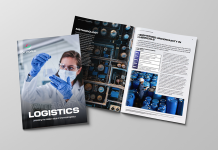Chemical logistics face the challenges of changing supply chains, digitalisation, and growing sustainability requirements. Challenges accelerated by the pandemic have made a stable network a critical success factor. Michael Kriegel, Department Head DACHSER Chem Logistics, provides an expert opinion on the implications the current global supply chain problems are causing for the sector.
The chemical industry is known as one of the most successful and competitive industries, and its growth trend is consistent.
Despite the industry growth, logistics services have been under considerable strain over the past two years due to disruptions to supply chains, shortages of materials, and capacity bottlenecks.
It is now necessary to use predictive planning to manage these difficulties so that supply chains can run without interruption.
Companies are currently in crisis mode, focussing entirely on procuring capacity at affordable rates and working with their logistics partners to find solutions for maintaining their supply chains. But, the medium to long term plans include companies planning structural changes to their sourcing patterns. Last summer, Dachser conducted an internal survey that revealed that 70 percent of customers polled were considering regionalising their supply chains.
Generally, the pattern is that the first chemical companies relocate production to the region with their largest sales markets; however, this will take some time and in no way heralds the end of globalisation. Reshoring or regionalising the supply chain completely would be suboptimal, not to mention risky.
However, this is about more than just regionalism; ensuring the stability of logistics networks and uninterrupted supply chains calls for logistics networks with flexible structures.
Our job as a logistics provider is to respond with alternatives while also expanding our own transport capacity, a crucial factor in avoiding or dealing with bottlenecks. A robust and balanced transport network, one remaining effective and controllable, even under the stress conditions caused by pandemics or other infrastructure capacity constraints, is vital.
Environmental sustainability is another timely consideration. Currently, Dachser is investing significantly in research and development in this field. While we have several electric vehicles deployed in city centres, there are still only a handful of zero-emission heavy trucks available on the market; and are required to distribute groupage shipments of chemical goods in the main carriage. So the main leverage we have to make chemical logistics more climate-friendly is still to optimise transport capacity. Ultimately, there’s nothing worse for the climate than empty runs.
Additional issues we foresee in the future, over and above those we’ve already touched, will be driver recruitment, digitalisation and supply chain resilience and the corresponding network mindset. The current bottlenecks are giving many companies a wake-up call. They want to and must position themselves to be more resilient if they want to improve the protection of their supply chains against potential dangers. IT security and IT resilience will also be among the top priorities because secure data, and the exchange of that data, keep the physical supply chain moving.










